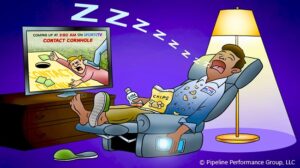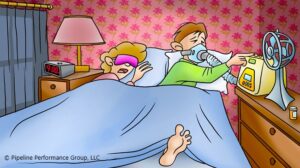It might be counter intuitive to advise avoiding the light, since most studies advise getting a good dose of sunlight to wake us up in the morning, increase our alertness, and decrease our grogginess. The purpose of this article is to provide reasons avoiding the light are necessary for shiftworkers after night shift and for any of us at night.
I had a 40-minute commute home when I was a shift worker. We finished night shift at 8:00am, so the drive home was in daylight. The light shining into my eyes triggered my body clock and that clock is most responsive to sunlight in the early morning, between 6:00am and 8:30am. Sometimes I wore sunglasses; sometimes I did not. In either case, I was too young and foolish to wear wrap around sunglasses that would have done a better job of blocking the sunlight. As a result, it would be difficult to go to sleep when I got home about 9:00am. If you finish night shift after daylight, seek to avoid the light by wearing wrap around sunglasses like people wear after eye examinations. Wear a cap or hat as an additional way to avoid the light. The blocking of the sunlight on your drive home will enable you to go to sleep more easily.
Once you are home and asleep, it is still important to avoid the light. Even if your eyes are closed, the sunlight entering the room tells your brain it is time to wake up. I think this is one of the reasons so many people working at night and sleeping in the daytime wake up after four or five hours. The sun gets high in the sky and the temperatures rise, and both the light and the heat affect our body clocks. If you have not already done so, install blackout shades or heavy curtains to block sunlight when you sleep. Keep the room dark and cool. One controller told me he has a separate bedroom for daytime sleeping that is dark, cool, and soundproof. He gets a better quality and quantity of sleep after night shifts than after day shifts.
When I was a welder helper, it was unwise to look at the blue light of the welding arc because it would “burn your eyes” and you would experience a great deal of pain. If we want to sleep well at night, we need to also avoid blue light from computer monitors and other devices close to bedtime because it tricks our brains into thinking it is daytime.
A reason to avoid blue light at night is that the pineal gland secretes the hormone melatonin in the evening. This signals the body and brain it is time to go to sleep. Blue light inhibits melatonin production and suppresses the “go to sleep” signal.
If you are going to look at computers and other devices close to bedtime, use amber-colored glasses because they effectively block all blue light. Then the brain does not get the signal to stay awake. Studies show that when people use blue-blocking glasses, they produce just as much melatonin as if it were dark. I have used some of these glasses at times and believe they are helpful. Glasses and other products are available at lowbluelights.com. Less expensive glasses are available on Amazon.com.
If you have an up to date computer or other device, they may have settings to filter blue light when using them at night. Of course, you could stop using the device two hours before you want to go to sleep or turn the brightness down or use a device with a black and white screen.
All of my life, I have advised people to walk in the light. That is sound advice except for those times when you need to sleep in the daytime or when you are using artificial light sources late at night near bedtime.




